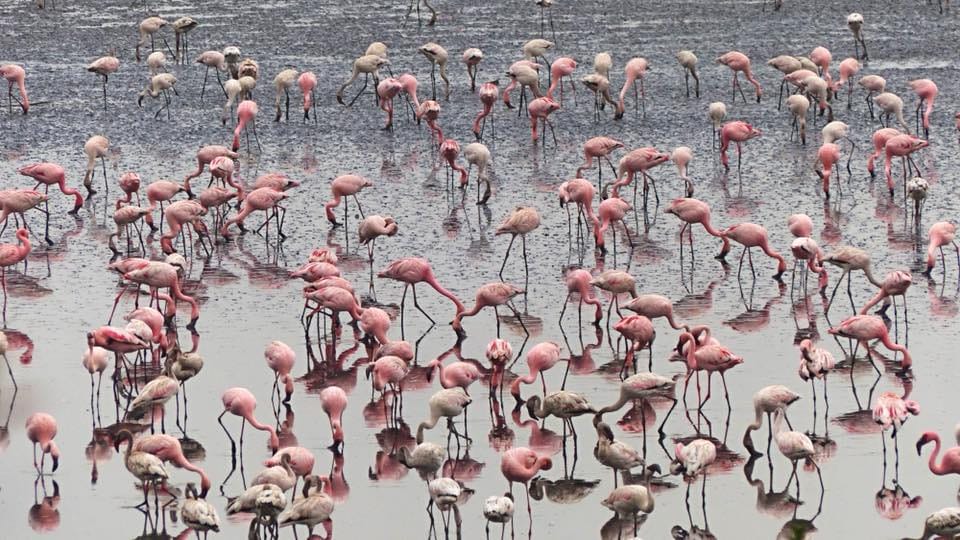In the midst of 2022, the phones of Navi Mumbai Environmental Preservation Society (NMEPS) members
buzzed incessantly as they received alarming news. A serene plot of land, home to sprawling mangroves, faced a perilous future. The announcement in July 2022 by CIDCO, the local development body, revealed plans to auction a 6.2 acres of land neighbouring a vast expanse of mangroves.
However, this was no ordinary piece of land. It was a vital habitat for thousands of flamingos, a cornerstone of the local ecosystem, and a site of paramount ecological importance.
NMEPS had previously organised extensive clean-up efforts in collaboration with local residents through their Shramdaan initiative on this very land parcel and the surrounding areas. Prompted by this disconcerting revelation, a diverse group of NMEPS members rallied together and resolved to take action.
Unbeknownst to them, another cohort of residents was equally distressed upon hearing the same
announcement.
The plot of land that they had long admired from their windows was under imminent threat.
Individuals such as Rekha Sankhala, Manmeet Singh Khurana, Ritu Mittal, R K Narayan, Mahendra Singh
Panghaal, Anjali Agarwal, Sunil Agarwal and Shruti Agarwal would soon emerge as champions of environmental preservation. These residents were unwilling to stand idly by when their cherished ecosystem was in jeopardy.
Read More: In the destruction of wetlands, is CIDCO above the law?
Why are wetlands important?
Wetlands provide habitat for thousands of species of aquatic and terrestrial plants and animals. Wetlands are valuable for flood protection, water quality improvement, shoreline erosion control, natural products, recreation, and aesthetics.
Wetlands are among the most productive habitats on earth providing shelter and nursery areas for commercially and recreationally important animals like fish and shellfish, as well as wintering grounds for migrating birds. Coastal marshes are particularly valuable for preventing loss of life and property by moderating extreme floods and buffering the land from storms. They also form natural reservoirs and help maintain desirable water quality.

With rising sea levels and increasingly intense storms associated with climate change, there is substantial interest in alternative defensive measures for protecting low-lying coastal communities against coastal flooding. Coastal wetlands are known to dampen storm surge and wind impacts, but policymakers have doubts about employing wetlands as natural levees due to lack of empirical evidence of effectiveness.
Mobilising public
Recognising the impending environmental crisis, these concerned residents turned to a stalwart ally, the Navi Mumbai Environmental Preservation Society (NMEPS), which had plans to legally contest the auction process. NMEPS had earned a reputation as a fearless advocate for safeguarding the local environment. Their track record included a relentless six-year legal battle through a Public Interest Litigation (PIL) in the High Court of Mumbai.
This notable battle had culminated in the cancellation of plans for a golf course in the city’s precious
wetlands. Furthermore, the court, recognising the necessity of sustained wetland protection, mandated the creation of a mechanism to ensure such preservation.
However, NMEPS was not content with just legal victories; they were equally passionate about involving the community in various initiatives to foster environmental awareness. Their annual World Wetlands Seminar, Inter-School Environment Quiz, and Painting Competition ignited the flame of environmental consciousness among students. Clean-up drives, nature trails, rallies, essay competitions, and Earth Day events underlined the importance of wetlands and mangroves in preserving our planet.
Strengthening the movement
United by a shared cause, the resident group joined hands with NMEPS, which provided crucial momentum to their collective mission. A closer examination of the situation revealed that approximately two-thirds of Plot 2A in Nerul sector 54-56-58, as delineated in the CIDCO tender documents, fell under the Coastal Regulation Zone (CRZ).
The CRZ, with its stringent construction regulations, was categorised into CRZ 1, designating it as a “no construction zone,” and CRZ 2, allowing limited construction with several restrictions. The auctioning of these plots by CIDCO seemed to blatantly contravene the CRZ provisions, with potentially dire consequences for the local environment.
Frustrated by their futile attempts to engage with various authorities and safeguard this invaluable land, the residents decided to take matters into their own hands.
NMEPS prepared to legally challenge the auction process and galvanised the residents, who were resolute in their commitment to prevent this environmental transgression at all costs. They were acutely aware that the development of this plot would not only bring an influx of crowds to their locality but also result in the loss of a precious habitat for the flamingos that graced their region.
Fast forward to Mid-July, 2022, and the residents of Navi Mumbai stood united in a remarkable display of
collective determination. They formed a human chain along the edge of the precious 6.2-acre plot that had become the focal point of their battle against authorities and the looming threat of construction.
This human chain was not merely a symbol of their unity; it was a poignant expression of their frustration and anger directed towards the authorities, who appeared willing to disregard the ecological significance of this land.
A more recent order by the NGT this month protects the land next to NRI Phase 1 from development.
We at NMEPS, are delighted with the order issued by the honourable NGT. This order will guarantee the safeguarding of the specified land.
We believe it will set a precedent and provide substantial support to citizen movements fighting against unauthorised developments by the authorities. In addition, it will act as a deterrent, discouraging builders and unscrupulous developers from engaging in similar CRZ projects.
| You can read more about us on our Facebook page: https://www.facebook.com/nmepsocietymibextid=LQQJ4d |